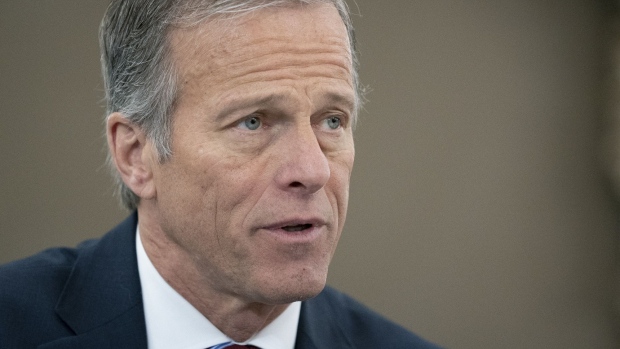Jan 7, 2022
Republicans Maneuver to Sidetrack Schumer on U.S. Voting Rights Bills
, Bloomberg News

(Bloomberg) -- Senate Majority Leader Chuck Schumer’s plan to muscle through the Senate sweeping voting rights legislation risks getting sidetracked by Republicans who are instead floating tweaks to the law governing the certification of Electoral College votes.
Schumer already has a tough task ahead if he goes through with forcing a vote to change the Senate’s filibuster rule in order to pass the voting rights bills with a simple majority. Two key Democrats -- Senators Joe Manchin of West Virginia and Kyrsten Sinema of Arizona -- are still not on board with getting rid of the 60-vote threshold to proceed with legislation.
In the meantime, Republicans are trying to entice Manchin and Sinema with alternatives. Maine Senator Susan Collins convened a Zoom call Wednesday with them and others in both parties to consider a bipartisan path on election law changes, including tweaks to the Electoral Count Act and other issues.
Both Senate GOP Leader Mitch McConnell and No. 2 Senate Republican John Thune told reporters this week they are open to changing the 150-year-old law. It’s designed to avert the kind of pressure former President Donald Trump exerted last year on his vice president, Mike Pence, to throw out some electoral votes from the 2020 election.
“There is no accident that this sudden move to reform the Electoral College is being put out there as a way to basically try to distract from the real work that we have to do, which is to make sure that everybody has elections that they can trust,” Democratic Senator Tina Smith of Minnesota said in an interview on Bloomberg Radio.
Democrats have pivoted to voting rights from President Joe Biden’s economic agenda as that legislation stalled because of Manchin’s objections. Schumer is using the anniversary of the Jan. 6, 2021 riot at the U.S. Capitol, which interrupted Congress’s certification of the Electoral College vote in the presidential election, as a rallying point to change U.S. election law.
McConnell and Republicans have used the filibuster to block the Democrats’ voting rights bills, which they argue needlessly impinge on states’ authority to set their own election laws and include ideas Democrats have been pushing for years before Trump’s attempt to overturn the 2020 election.
Narrow Target
A Senate GOP leadership aide said modifying the Electoral Count Act, unlike the Democratic election bills, actually responds to what happened last year. McConnell told reporters this week that the law “obviously has some flaws. And it is worth, I think, discussing.”
Schumer warned repeatedly this week against such a narrowly targeted action. He said the changes being proposed “would do nothing more than codify the vice president’s ceremonial role in counting the Electoral College votes.”
But with some states tightening voting laws and considering steps on oversight of voting results, he said, partisan state legislatures “could overturn the elections without fear or recourse.”
While Schumer pushes to change the Senate’s filibuster rules, which give the minority a veto over most legislation, to clear the voting rights legislation, Manchin and Sinema are taking part in discussions about more modest proposals aimed at drawing Republican support.
“Senator Sinema continues to believe bipartisan action is needed to strengthen our democracy and she has been in constant contact with colleagues in both parties on this and other potential areas of common ground,” Hannah Hurley, Sinema’s press secretary, said.
Other senators involved in those discussions included Republicans Thom Tillis of North Carolina, Mitt Romney of Utah, Roger Wicker of Mississippi and Democrat Jeanne Shaheen of New Hampshire.
Schumer said in an interview Thursday on “CBS This Morning” that he still plans to plow ahead with votes on Jan. 17, which is Martin Luther King Jr. Day. He wants to pass both the broad voting rights reform bill and a narrower bill called the John Lewis Voting Rights Act that would restore Justice Department oversight of voting laws in some states. If they fail to get the 10 GOP votes needed to advance to the floor as expected, he said, he’ll use the so-called nuclear option and try to change Senate filibuster rules.
“If we have to change the rules to do it, we will have to vote on changing the rules,” Schumer said. “We don’t have all the votes for that yet, but we’re fighting every day to get them.”
Filibuster
Democratic Representative James Clyburn of South Carolina, who has been a vocal advocate for the voting legislation, said on Bloomberg Television’s “Balance of Power with David Westin” that the filibuster shouldn’t apply to the issue of voting rights. He said the 15th Amendment to the Constitution, which gave Blacks the right to vote, was approved by Congress on a party-line vote.
“Senator Manchin seems to feel that unless it is bipartisan it is not worth doing,” Clyburn said. “History says otherwise.”
Manchin has said there are some filibuster reforms he could support that include lowering the threshold to end debate on legislation from 60 votes to three-fifths of those present and voting, and requiring “talking filibusters,” where senators seeking to block legislation must stay on the floor to maintain endless debate.
He also reiterated his “absolute preference” for bipartisan action. He told reporters this week that changing Senate rules for the voting rights legislation so it can move forward with just 51 votes instead of 67 would be “a heavy lift.”
©2022 Bloomberg L.P.






